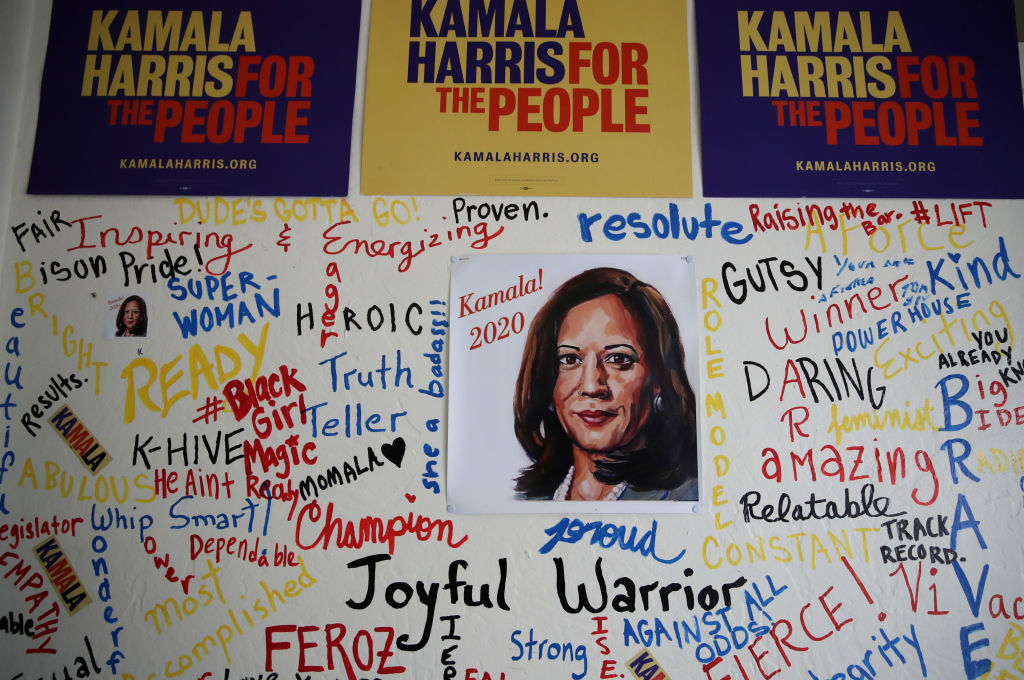Kamala Harris began her campaign with an impressive display of political might: a gigantic late-January rally in her hometown of Oakland, California, where 22,000 people turned up for her first major speech as a presidential candidate. “We are at an inflection point in the history of our nation,” the senator from California bellowed into the microphone. “We are here because the American dream and our American democracy are under attack and on the line like never before. And we are here at this moment in time because we must answer a fundamental question: Who are we?”
On 4 December, it all came crashing down. Staff infighting, financial pains, and a rudderless campaign forced the aspiring commander-in-chief to call it quits before the very first votes were cast. According to NBC News, Harris spent the weekend pouring over the campaign’s expenditures and concluded she didn’t have the money to keep going.
Kamala’s is a classic story of a burnout campaign that peaked too early. If her first two months on the stump consisted of a hefty £9m ($12m) fundraising hall and a solid debate performance against frontrunner Joe Biden, the remainder of the year was a combination of bad headlines in the major papers, questions about her viability in the early primary states and doubts about her authenticity.
Her flip-flopping on the subject of health care reform and her struggle to go beyond scripted talking points and catchy phrases made voters sceptical that she had any firm beliefs. The flare-ups between her campaign manager, her sister (and chief adviser), and her financial team on everything from where to allocate resources to how to divide the workload left the entire team swimming in circles.
The finger-pointing and sudden staff firings were such a drain on morale that Harris’ state operations director wrote a letter to headquarters condemning the campaign for shoddy treatment. “This is my third presidential campaign and I have never seen an organisation treat its staff so poorly,” Kelly Mehlenbacher wrote days before resigning and joining former New York City mayor Mike Bloomberg’s operation. Needless to say, it’s difficult to run the world’s most powerful country if you can’t even run your own campaign properly.
The bad news kept on coming for Harris too. Every time it appeared as if the former prosecutor and California attorney general turned a corner, a new poll would be released showing how weak her numbers were. RealClearPolitics’ average of polls put Harris at 3.4 per cent, below Bloomberg (who just announced his candidacy a week ago) and barely above Andrew Yang. Her support in Iowa wasn’t any better; at three per cent, she was at the bottom of the scrum. Given the fact Harris’s chances rested on a decent showing in the first caucus state, the numbers previewed a conclusion the candidate couldn’t dodge: in reality, there was no way she could maintain momentum, let alone win the Democratic nomination.
The person most pleased with Kamala’s departure from the race is Biden. He won’t say as much in public, of course. Indeed, upon learning the news, Biden heaped compliments on Harris for her intelligence and skill. In Biden’s own words, “[Sen. Kamala Harris] is a first-rate intellect, a first-rate candidate and a real competitor.”
Yet given that Biden was the senator’s favourite target, it’s hard not to imagine the former VP going back to his hotel room at the end of the day with a smile on his face.
Sold as a rising star of the Democratic party, Kamala Harris will now return to the Senate as just another also-ran. Her top priority will now be defending her seat, which is on the ballot in 2022. But make no mistake: Harris doesn’t want to stay in the Senate for 30 years. She has climbed the ladder over the last decade and remains a dreamer with bigger plans, like another run for president.






Comments